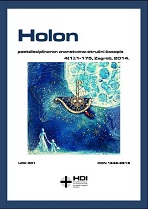Provjera metrijskih karakteristika skale transcendentalne budućnosti kao vremenske perspektive
A check of measurement characteristics of the transcendental-future time perspective scale
Author(s): Selman RepištiSubject(s): Psychology
Published by: Hrvatsko društvo za integralnost
Keywords: intellect; conventionality; openness to experience; religiosity; transcendental-future; time perspective; satisfaction with life
Summary/Abstract: The temporal perspective paradigm is a new approach, based on a unique combination of conceptions of time in the field of psychology, anthropology and sociology. It is postulated that each person can interpret his/her experience and behave in accordance with six temporal styles: past positive, past negative, present hedonistic, present fatalistic, and future transcendental. Since the last time perspective has not been explored enough, in this paper factor validity of its operationalization is examined (Transcendental-Future Time Perspective Scale - TFTPS). The second objective of this paper is to investigate correlations between TFTPS results and general life satisfaction, openness to experience and subjective assessment of religiosity. A convenient sample of 178 participants, from 18 to 59 years old has been collected. The following instruments were used: TFTPS, an item for assessment of general life satisfaction, an item for subjective assessment of religiosity, and a group of International Personality Item Pool (IPIP) statements related to the measurement of openness to experience. The instruments have been applied through one of the online servers, which is usually used for this purpose. Results indicate a relatively satisfactory construct validity of TFTPS, with certain modifications suggested for its content. Results on the Transcendental-Future Time Perspective Scale are not statistically significant correlated with life satisfaction or positive version of openness to experience (intellect/imagination), but were statistically significant correlated with the negative version of openness to experience (conventionality/conservatism) and subjective assessment of religiosity. At the end of the paper, the following has been discussed: advantages and disadvantages of the present research, possibilities for improving the quality of TFTPS and further steps in the scientific approach to this field.
Journal: Holon
- Issue Year: IV/2014
- Issue No: 1
- Page Range: 35-57
- Page Count: 23
- Language: Croatian

